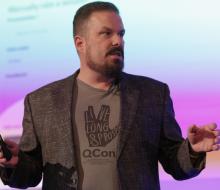


What happens when experienced software leaders pair with AI and take a lean thinking approach to building a new product? AI turns lean thinking experimentation into a superpower.
In this talk, we share AI-assisted delivery techniques like Chat-Oriented Programming (ChOP), Retrieval-Augmented Generation (RAG), and structured prompt engineering that were used to create a first-of-its-kind certification program for QCon, one of the world’s leading conferences for senior developers, architects, and tech decision-makers.
To deepen engagement with QCon’s technically sophisticated audience, we created the InfoQ Certified Software Architect in Emerging Technologies (ICSAET)—a certification that demonstrates mastery of cutting-edge practices through immersive, real-world experience. We piloted the program at QCon London 2025, using combinations of invite-only sessions, small-group lunches, and a 3-hour hands-on workshop to capture and distill the event’s most important insights.
This session shares how we fused human intuition with AI-Driven software practices today to build the program, the infrastructure behind it, and the MVP that delivered the content.
You’ll learn:
- Lean Startup meets AI: How we used AI to accelerate Build-Measure-Learn loops, rapidly validate ideas, and evolve our certification program in real time—demonstrating how AI turbocharges lean thinking to turn experimentation into innovation.
- Agentic Engineering in action: What it means to move fast with AI tools while still designing maintainable systems—introducing Agentic Engineering as a human-centered approach to AI-driven software delivery.
- How we built the pipeline: Transcribing conference talks, generating OpenAI embeddings, and storing them in Pinecone (a vector database) to support real-time querying by LLMs.
- LLM-powered development in practice: Using Cursor and Claude Sonnet 3.7 with structured prompt templates (based on a Think–Plan–Execute model) to develop the pipeline.
- Designing the Dense Retreiver: How we architected a K-Nearest Neighbor (KNN) API to support question answering use cases and surfaced it as a GPT with ChatGPT
This talk, led by Wes Reisz (QCon.AI chair and software consultant at Equal Experts), explores how pragmatic AI-driven delivery can reduce complexity while amplifying what experienced practitioners do best. We’ll share what we built, what we learned (including the mistakes and missteps), and how those lessons are shaping the future of the ICSAET program.
Speaker

Wes Reisz
Technical Principal @EqualExperts | ex-Thoughtworker & ex-VMWare | 16-Time QCon Chair | Creator/Co-host of The InfoQ Podcast
With over 20 years of experience in software engineering, Wesley Reisz has chaired more than 16 QCon software conferences across San Francisco, London, and New York, founded the highly respected InfoQ Podcast, and spent over a decade teaching 400-level software architecture and programming courses at the University of Louisville. These experiences have given him deep expertise in software architecture, cloud-native engineering, and platform thinking, alongside a broad knowledge of various software domains.
Wes is a Technical Principal Consultant at Equal Experts, specializing in reducing complexity in software using application modernization, platform engineering, and AI Enabled Delivery. He embodies the concept of a T-shaped engineer—blending broad expertise across software domains with deep technical knowledge of the cloud-native ecosystem—and strongly believes in the transformative power of speaking, teaching, and continuous learning.
Before joining Equal Experts, Wes held technical leadership roles at:
- Thoughtworks, where he focused on cloud and modernization
- VMware, as a Tanzu Platform Architect specializing in Spring, Kubernetes, and developer paths to production
- An edge-related startup, where he served as VP of Technology, driving innovation at the edge
You can reach Wes via:




